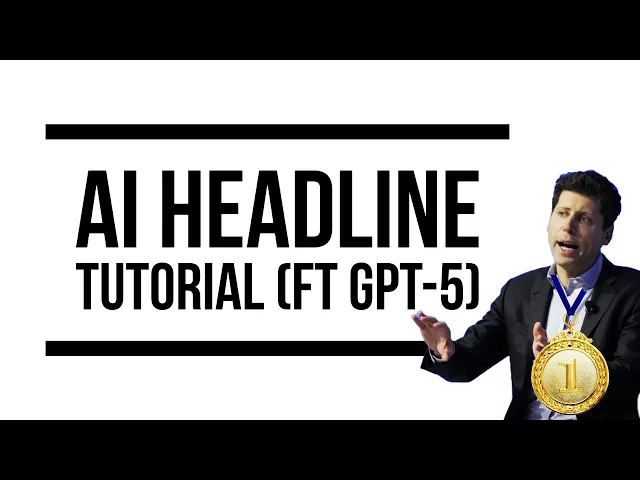How Not to Read a Headline on AI (ft. new Olympiad Gold, GPT-5 …)

Don't be fooled by AI headlines
The digital world has become a minefield of sensationalist headlines, particularly when it comes to artificial intelligence breakthroughs. In a recent video, prominent AI researcher Andrej Karpathy provides a masterclass in media literacy by examining how headlines about AI developments often mislead readers through careful wording and lack of context. His critical analysis arrives at a crucial moment when distinguishing between genuine AI progress and overblown claims has never been more important.
Key insights from Karpathy's analysis:
-
Headlines are deliberately crafted to mislead – Publishers use vague language and strategic omissions to make AI breakthroughs sound more revolutionary than they are, often manipulating facts to increase engagement.
-
Context is systematically stripped away – What might be a narrow achievement in a specific domain gets presented as a general capability, creating a false impression of AI systems' true abilities.
-
Technical details matter enormously – The difference between a model doing something in a highly controlled setting versus performing consistently in the real world is massive, yet headlines rarely make this distinction.
The cognitive bias we can't ignore
Perhaps the most valuable insight from Karpathy's analysis is how our cognitive biases make us susceptible to misleading headlines. When we read "AI can now X," our brains automatically fill in gaps with assumptions about what that capability means in practice. This mental shortcut—assuming a capability demonstrated in a narrow research context translates to robust real-world performance—creates a persistent gap between public perception and technical reality.
This matters tremendously because these misperceptions influence important decisions. Investors pour money into overhyped technologies, policymakers craft regulations based on incomplete understandings, and businesses adopt solutions before they're truly viable. The consequences ripple through the economy as resources get misallocated and opportunities for more meaningful progress are missed.
What the video doesn't cover: The economics of hype
Behind every misleading headline lies a complex ecosystem incentivizing exaggeration. Tech publications compete fiercely for attention in a crowded media landscape. Research labs and AI companies benefit from increased valuations and funding when their work appears groundbreaking. Even academic researchers face pressure to frame incremental advances as revolutionary breakthroughs to secure grants and recognition.
Consider OpenAI's roll
Recent Videos
How To Earn MONEY With Images (No Bullsh*t)
Smart earnings from your image collection In today's digital economy, passive income streams have become increasingly accessible to creators with various skill sets. A recent YouTube video cuts through the hype to explore legitimate ways photographers, designers, and even casual smartphone users can monetize their image collections. The strategies outlined don't rely on unrealistic promises or complicated schemes—instead, they focus on established marketplaces with proven revenue potential for image creators. Key Points Stock photography platforms like Shutterstock, Adobe Stock, and Getty Images remain viable income sources when you understand their specific requirements and optimize your submissions accordingly. Specialized marketplaces focusing...
Oct 3, 2025New SHAPE SHIFTING AI Robot Is Freaking People Out
Liquid robots will change everything In the quiet labs of Carnegie Mellon University, scientists have created something that feels plucked from science fiction—a magnetic slime robot that can transform between liquid and solid states, slipping through tight spaces before reassembling on the other side. This technology, showcased in a recent YouTube video, represents a significant leap beyond traditional robotics into a realm where machines mimic not just animal movements, but their fundamental physical properties. While the internet might be buzzing with dystopian concerns about "shape-shifting terminators," the reality offers far more promising applications that could revolutionize medicine, rescue operations, and...
Oct 3, 2025How To Do Homeless AI Tiktok Trend (Tiktok Homeless AI Tutorial)
AI homeless trend raises ethical concerns In an era where social media trends evolve faster than we can comprehend them, TikTok's "homeless AI" trend has sparked both creative engagement and serious ethical questions. The trend, which involves using AI to transform ordinary photos into images depicting homelessness, has rapidly gained traction across the platform, with creators eagerly jumping on board to showcase their digital transformations. While the technical process is relatively straightforward, the implications of digitally "becoming homeless" for entertainment deserve careful consideration. The video tutorial provides a step-by-step guide on creating these AI-generated images, explaining how users can transform...
